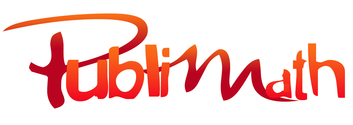Annales de didactique et de sciences cognitives. V. 8. p. 13-62. Décrire, visualiser ou raisonner : Quels apprentissages premiers de l’activité mathématique ?
English Title : Description, visualisation and reasoning: which ''prime learnings''in mathematical activity?.
Une version texte intégral est en téléchargement sur le site Bibliothèque numérique des IREM et de l’APMEP Télécharger
Auteur : Duval Raymond
Résumé
L’observation des phénomènes, l’enregistrement de données nouvelles et leur description ont un rôle primordial dans le travail scientifique. Abstract The observation of phenomena, the recording of new data, and their description play a major role in any scientific work, for knowledge first depends on the spread of a field of observations and on the degree of their discrimination. By highlighting the role of ‘conceptions’, ‘explanations’and ‘validation’, do the teaching of sciences tend to underestimate the real time and the decisive role of the work of observation and description, which sciences learning requires? This is the issue that we intend to argue about, by focusing on an area in which the observation of phenomena is beyond any perception: mathematics. With this aim in view, we will analyse the kind of problems teaching provides for learning and, in order to understand the activity is truly required of students in problem solving, we must distinguish the backward analysis from the forward analysis. The problems given for a learning purpose have a common striking feature: they arise from the (variable) gap between the complete description of some situation and one of the different minimal descriptions that can be derived from it. And the kind of required activity consists in understanding the description of the given of the problem and, sometimes, in producing new data in order to supplement the description. We will find that the same kind of activity must support other mathematical processes such as generalisation, search for counter-example.. Forward analysis, which is the classical one in didactics, involves analysing the (semiotic) production of students: both verbal data, including the deep variation from oral mode to the writing one, and visual creation (drawings, diagrams, schemata..). There the analysis of students’s productions meets the analysis of descriptions of observations within other sciences. We will show the necessity of taking into account several levels into the articulation of meaning, both in speech and in semiotic visualisation. Otherwise students’s productions cannot be interpreted in a relevant way. The importance of description tasks for mathematics learning is because any describing is an activity of representation, which mobilises one or several semiotic registers and which depends on the degree of their acquisition by students. But the fact that any describing is an explicit process of representation raises several crucial issues about research on mathematics education.
L’importance des tâches de description dans l’apprentissage ne tient pas seulement au fait qu’elles sont intrinsèques à l’observation des phénomènes, base de toute connaissance, mais qu’elles consistent également en une activité de représentation qui implique la mobilisation d’un ou plusieurs registres sémiotiques et qui dépend de leur maîtrise par les élèves. Mais ce fait que toute description soit une démarche de représentation soulève plusieurs questions décisives pour les recherches sur l’apprentissage des mathématiques.
Notes
Consultez les autres articles du Volume 8 qui contient la première partie des contributions du colloque Argentoratum 2002.
La revue « Annales de didactique et de sciences cognitives » publie des articles de recherches en didactique des mathématiques propres à développer et à stimuler la réflexion sur l’enseignement des mathématiques en direction de tous les types de publics : écoliers, lycéens, étudiants et enseignants en formation.
Données de publication
Éditeur IREM de Strasbourg Strasbourg , 2003 Format 17 cm x 23 cm, p. 13-62 Index Bibliogr. p. 58-59
ISSN 0987-7576
Public visé chercheur, enseignant, formateur
Type article de périodique ou revue Langue français Support papier
Classification
Mots-clés
